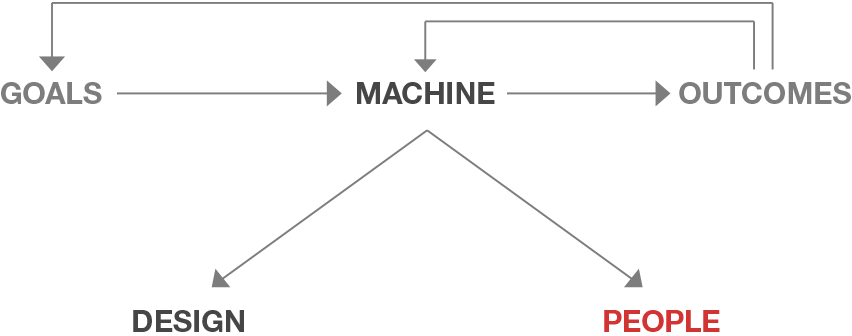To Get The People Right (37-47)
37.THE THE MOST IMPORTANT DECISION YOU CAN MAKE IS WHO YOU CHOOSE AS YOUR RESPONSIBLE PARTY
38.Remember that almost everything good comes from having great people operating in a great culture.
I cannot emphasize strongly enough how important the selection, training, testing, evaluation, and sorting out of people is. If you put the goals and the tasks in the hands of people who can do them well, and if you make crystal clear that they are personally responsible for achieving the goals and doing the tasks, they should produce excellent results. This section is about the people part of the feedback loop process, diagramed below.

39.First, match the person to the design.
Understand what attributes matter most for a job, and then ascertain whether an individual has them.This matching process requires 1) visualizing the job and the qualities needed to do it well and then 2) ascertaining if the individual has those qualities.
Look for believable responsible parties who love producing great results. Remember that values are most important—e.g., if “work” is what people have to do to make money, I don’t want people to “work” here. I only want people at Bridgewater who are joining us on an important, shared mission to do great things.
39A. Most importantly, find people who share your values. At Bridgewater, those key values are a drive for excellence, truth at all costs, a high sense of ownership, and strong character (by character, I mean the willingness to do the good but difficult things).
39B. Look for people who are willing to look at themselves objectively and have character. These are not natural talents—they are qualities that anyone can acquire. They are also the qualities that have the biggest influence on whether or not I respect someone. They are essential for success.
39C. Conceptual thinking and common sense are required in order to assign someone the responsibility for achieving goals (as distinct from tasks).
40.Recognize that the inevitable responsible party (RP) is the person who bears the consequences of what is done.
Because of this, the RP must choose wisely when delegating responsibilities to others, and he must incentivize and manage them appropriately. There is no escaping that. For example, you are the inevitable RP for taking care of your health because you’re the one who inevitably bears the consequences. If you’re sick, you might choose to delegate the responsibility of figuring out what do to about it to a doctor. However, it is your responsibility to pick the right doctor because you will bear the consequences of that decision. While it is, of course, also the doctor’s responsibility to handle the responsibilities that you delegate to him, you still need to make sure that his incentives are aligned with his responsibilities and that he is doing his job well. The inevitable responsible party can’t delegate all his responsibilities away and expect good outcomes, even in cases in which he has no expertise. So you can’t escape hiring and managing properly.
41.By and large, you will get what you deserve over time.
The results that you end up with will reflect how you and your people learn to handle things. So take control of your situation and hold yourself and others accountable for producing great results. People who wish for a great result but are unwilling to do what it takes to get there will fail.
42.The most important responsible parties are those who are most responsible for the goals, outcomes, and machines (they are those higher in the pyramid).
Give me someone who can effectively be responsible for an area—i.e., who can design, hire, and sort to achieve the goal-and I can be comfortable about all that is in that area. Therefore, they are the most important people to choose and manage well.
43.Choose those who understand the difference between goals and tasks to run things.
Otherwise you will have to do their jobs for them. The ability to see and value goals is largely innate, though it improves with experience. It can be tested for, though no tests are perfect.
44.RECOGNIZE THAT PEOPLE ARE BUILT VERY DIFFERENTLY
45.Think about their very different values, abilities, and skills.
Values are the deep-seated beliefs that motivate behaviors; people will fight for their values, and values determine people’s compatibility with others. Abilities are ways of thinking and behaving. Some people are great learners and fast processors; others possess common sense; still others think creatively or logically or with supreme organization, etc. Skills are learned tools, such as being able to speak a foreign language or write computer code.
While values and abilities are unlikely to change much, most skills can be acquired in a limited amount of time (e.g., most master’s degrees can be acquired in two years) and often change in worth (e.g., today’s best programming language can be obsolete in a few years).
It is important for you to know what mix of qualities is important to fit each role and, more broadly, with whom you can have successful relationships. In picking people for long-term relationships, values are most important, abilities come next, and skills are the least important.